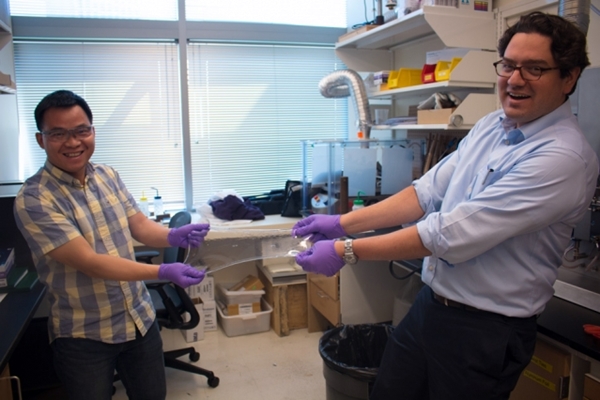
Jinyao Liu, left, and Giovanni Traverso stretch the drug-delivery hydrogel. (Mass. Institute of Technology)
26 July 2017. A medical engineering team developed and tested in animals a new water-based polymer material to deliver drugs for long-term release in the stomach. Researchers from Massachusetts Institute of Technology and Brigham and Women’s Hospital in Boston describe their findings in yesterday’s issue of the journal Nature Communications.
The team from the lab of chemical engineering professor Robert Langer at MIT and Giovanni Traverso, a gastroenterologist and biomedical engineer at Brigham and Women’s, is seeking a way to deliver drugs that can be taken one time and and released over a period of days or weeks, rather than asking patients to take drugs daily or more often over that period. For individuals in resource-limited regions, adherence to repeated medications is difficult, particularly for diseases like malaria that require taking drugs over an extended period of time.
The Bill and Melinda Gates Foundation that supports efforts to eradicate tropical diseases like malaria is a funder of this project. “We have been working with the Bill and Melinda Gates Foundation,” says Langer in an MIT statement, “to develop ultra-long-lasting capsules, which might last for the entire course of a treatment, or could be taken once a week or once a month, depending on the device.”
Langer, Traverso, and colleagues began with hydrogel, a soft material made largely of water, but with enough of a polymer network to maintain a three-dimensional gelatinous structure. To give the delivery material more resilience, the team added alginate, a biomaterial often combined with hydrogels, found in wound dressings and used for drug delivery and tissue engineering. The researchers also added polyacrylamide for extra toughness, a common water-soluble biocompatible polymer that increases viscosity in water and encourages accumulation or clumping of particles.
In addition, the delivery material is cross-linked with chemical bonds that react to common compounds to breakdown and dissolve the alginate and polyacrylamide. Small amounts of these compounds help break down the cross-linked bonds in the hydrogel triggering the slow release of the drugs being delivered. However, larger amounts would work faster, if needed. With this feature, simple antidotes could be taken if the patient needed to dissolve and remove the material from the stomach.
The team found it could prepare the material in a straightforward mixing and heating process, followed by purification. Analysis of the material shows it contains 87 percent water, yet can withstand stresses 14 to 32 times those of hydrogels mixed with polyacrylamide or alginate alone. Fracture and tensile strength tests show the toughened hydrogel even resists cutting with a razor blade.
The material is designed to be ingested in dehydrated form, combined with the delivered drug in a capsule. In the stomach, the material rehydrates and swells, then followed by a triggering solution, to start the slow release of the drug. The researchers tested delivery of the malaria drug lumefantrine using this material with Yorkshire pigs, which have gastrointestinal organs similar in size to humans. The tests show the toughened hydrogel releases lumefantrine over 7 to 9 days.
The team also tested lumefantrine given freely to the pigs, which clear the drug quickly from the blood. Using the toughened hydrogel delivery, lumefantrine remains in the blood for at least 4 days.
First author and postdoctoral researcher Jinyao Liu, with Langer and Traverso, applied for a patent on the toughened triggered hydrogel technology. The researchers expect the material can be used in weight-loss interventions, tissue engineering, and delivery of ingestible electronics, as well as delivering drugs.
More from Science & Enterprise:
- Takeda, Biosurfaces Partner on Nanofiber Devices
- Flu Vaccine Patch Shown Safe, Responsive
- Nanoparticles Built to Detect, Measure Peanut Allergy
- 3-D Printed Patch Helps Grow New Blood Vessels
- Bacteria Engineered to Act as Long-Term Gut Sensors
* * *

 RSS - Posts
RSS - Posts
You must be logged in to post a comment.